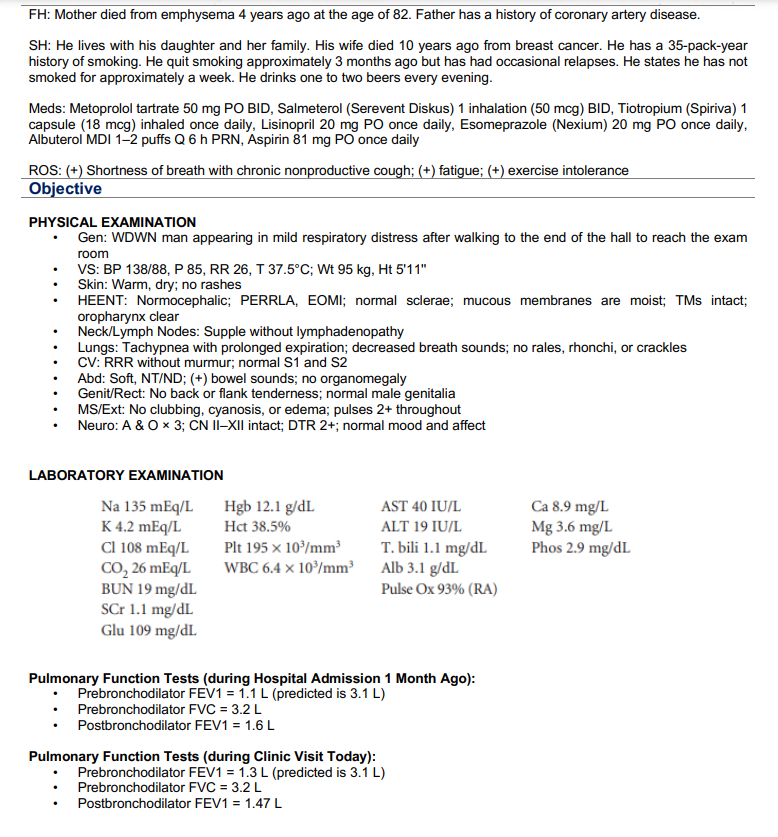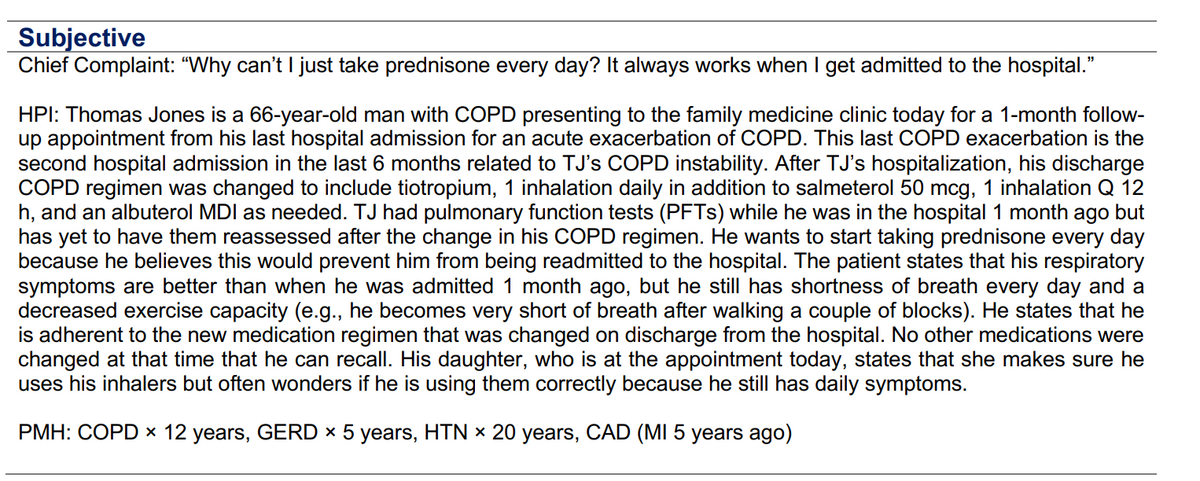Essentials Health Info Management Principles/Practices
4th Edition
ISBN:9780357191651
Author:Bowie
Publisher:Bowie
Chapter6: Patient Record Documentation Guidelines: Inpatient, Outpatient, And Physician Office
Section6.5: Physician Office Record
Problem 4E
Related questions
Question
B. RELATED QUESTIONS:
1. Discuss what is COPD and its pathophysiology
2. Discuss the pharmacologic and nonpharmacologic interventions for COPD

Transcribed Image Text:FH: Mother died from emphysema 4 years ago at the age of 82. Father has a history of coronary artery disease.
SH: He lives with his daughter and her family. His wife died 10 years ago from breast cancer. He has a 35-pack-year
history of smoking. He quit smoking approximately 3 months ago but has had occasional relapses. He states he has not
smoked for approximately a week. He drinks one to two beers every evening.
Meds: Metoprolol tartrate 50 mg PO BID, Salmeterol (Serevent Diskus) 1 inhalation (50 mcg) BID, Tiotropium (Spiriva) 1
capsule (18 mcg) inhaled once daily, Lisinopril 20 mg PO once daily, Esomeprazole (Nexium) 20 mg PO once daily,
Albuterol MDI 1-2 puffs Q 6 h PRN, Aspirin 81 mg PO once daily
ROS: (+) Shortness of breath with chronic nonproductive cough; (+) fatigue; (+) exercise intolerance
Objective
PHYSICAL EXAMINATION
Gen: WDWN man appearing in mild respiratory distress after walking to the end of the hall to reach the exam
room
VS: BP 138/88, P 85, RR 26, T 37.5°C; Wt 95 kg, Ht 5'11"
Skin: Warm, dry; no rashes
HEENT: Normocephalic; PERRLA, EOMI; normal sclerae; mucous membranes are moist; TMs intact;
oropharynx clear
Neck/Lymph Nodes: Supple without lymphadenopathy
.
.
.
Lungs: Tachypnea with prolonged expiration; decreased breath sounds; no rales, rhonchi, or crackles
CV: RRR without murmur; normal S1 and S2
Abd: Soft, NT/ND; (+) bowel sounds; no organomegaly
Genit/Rect: No back or flank tenderness; normal male genitalia
MS/Ext: No clubbing, cyanosis, or edema; pulses 2+ throughout
Neuro: A & O x 3; CN II-XII intact; DTR 2+; normal mood and affect
LABORATORY EXAMINATION
Na 135 mEq/L
K 4.2 mEq/L
Cl 108 mEq/L
CO₂ 26 mEq/L
BUN 19 mg/dL
SCr 1.1 mg/dL
Glu 109 mg/dL
Hgb 12.1 g/dL
Hct 38.5%
Plt 195 x 10³/mm³
WBC 6.4 x 10³/mm³
AST 40 IU/L
ALT 19 IU/L
T. bili 1.1 mg/dL
Alb 3.1 g/dL
Pulse Ox 93% (RA)
Pulmonary Function Tests (during Hospital Admission 1 Month Ago):
Prebronchodilator FEV1 = 1.1 L (predicted is 3.1 L)
Prebronchodilator FVC = 3.2 L
Postbronchodilator FEV1 = 1.6 L
Pulmonary Function Tests (during Clinic Visit Today):
Prebronchodilator FEV1 = 1.3 L (predicted is 3.1 L)
Prebronchodilator FVC = 3.2 L
Postbronchodilator FEV1 = 1.47 L
Ca 8.9 mg/L
Mg 3.6 mg/L
Phos 2.9 mg/dL

Transcribed Image Text:Subjective
Chief Complaint: "Why can't I just take prednisone every day? It always works when I get admitted to the hospital."
HPI: Thomas Jones is a 66-year-old man with COPD presenting to the family medicine clinic today for a 1-month follow-
up appointment from his last hospital admission for an acute exacerbation of COPD. This last COPD exacerbation is the
second hospital admission in the last 6 months related to TJ's COPD instability. After TJ's hospitalization, his discharge
COPD regimen was changed to include tiotropium, 1 inhalation daily in addition to salmeterol 50 mcg, 1 inhalation Q 12
h, and an albuterol MDI as needed. TJ had pulmonary function tests (PFTs) while he was in the hospital 1 month ago but
has yet to have them reassessed after the change in his COPD regimen. He wants to start taking prednisone every day
because he believes this would prevent him from being readmitted to the hospital. The patient states that his respiratory
symptoms are better than when he was admitted 1 month ago, but he still has shortness of breath every day and a
decreased exercise capacity (e.g., he becomes very short of breath after walking a couple of blocks). He states that he
is adherent to the new medication regimen that was changed on discharge from the hospital. No other medications were
changed at that time that he can recall. His daughter, who is at the appointment today, states that she makes sure he
uses his inhalers but often wonders if he is using them correctly because he still has daily symptoms.
PMH: COPD × 12 years, GERD × 5 years, HTN × 20 years, CAD (MI 5 years ago)
Expert Solution
This question has been solved!
Explore an expertly crafted, step-by-step solution for a thorough understanding of key concepts.
Step by step
Solved in 3 steps

Recommended textbooks for you

Essentials Health Info Management Principles/Prac…
Health & Nutrition
ISBN:
9780357191651
Author:
Bowie
Publisher:
Cengage

Understanding Health Insurance: A Guide to Billin…
Health & Nutrition
ISBN:
9781337679480
Author:
GREEN
Publisher:
Cengage


Essentials Health Info Management Principles/Prac…
Health & Nutrition
ISBN:
9780357191651
Author:
Bowie
Publisher:
Cengage

Understanding Health Insurance: A Guide to Billin…
Health & Nutrition
ISBN:
9781337679480
Author:
GREEN
Publisher:
Cengage
